Stacey Abrams On Voting Rights, COVID-19, And Being Vice President
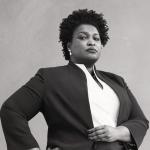
Experienced politicians know there is a right way to answer questions about pursuing higher office. Be demure. Redirect. Convey vague interest while insisting never to have given it serious consideration. But Stacey Abrams does not give the expected answer when I ask if she would accept an offer from former vice president Joe Biden to serve as his 2020 running mate. “Yes. I would be honored,” Abrams says. “I would be an excellent running mate. I have the capacity to attract voters by motivating typically ignored communities. I have a strong history of executive and management experience in the private, public, and nonprofit sectors. I’ve spent 25 years in independent study of foreign policy. I am ready to help advance an agenda of restoring America’s place in the world. If I am selected, I am prepared and excited to serve.”
Abrams’s direct response betrays ambition, makes verifiable claims, and establishes outcomes to which she could later be held accountable. By normal political rules, it is the wrong answer. But as Abrams and I talk in March in the midst of the COVID-19 crisis, it is clear that normal political rules no longer apply. I’m asking her about an unknown political future even as the future itself is frighteningly unknowable: schools closing, businesses shuttering, and Americans sheltering against a raging virus we can barely fathom. Amid this chaotic unpredictability, Abrams’s candor is disarming and comforting.
Into the Unknown
In the March 15 televised debate, Biden committed to choosing a woman as his running mate. Less than a week later, the progressive strategy network Way to Win released survey data indicating Stacey Abrams was Biden’s strongest potential lieutenant. A graduate of Spelman College, the LBJ School of Public Affairs at UT Austin, and Yale Law School, Abrams made history as the first woman to lead a political party in Georgia’s General Assembly and the first African American to lead the Georgia House of Representatives. In 2018, she pursued history again, mounting an ultimately unsuccessful campaign to become America’s first black woman governor. Her defeat came amid election irregularities and allegations of voter suppression. Abrams refused to concede the close race to her Republican opponent, Brian Kemp. “I’m supposed to say nice things and accept my fate,” Abrams writes in the preface to her New York Times best-seller, Lead From the Outside. “I refused to be gaslighted into throwing away my power, diminishing my voice.”
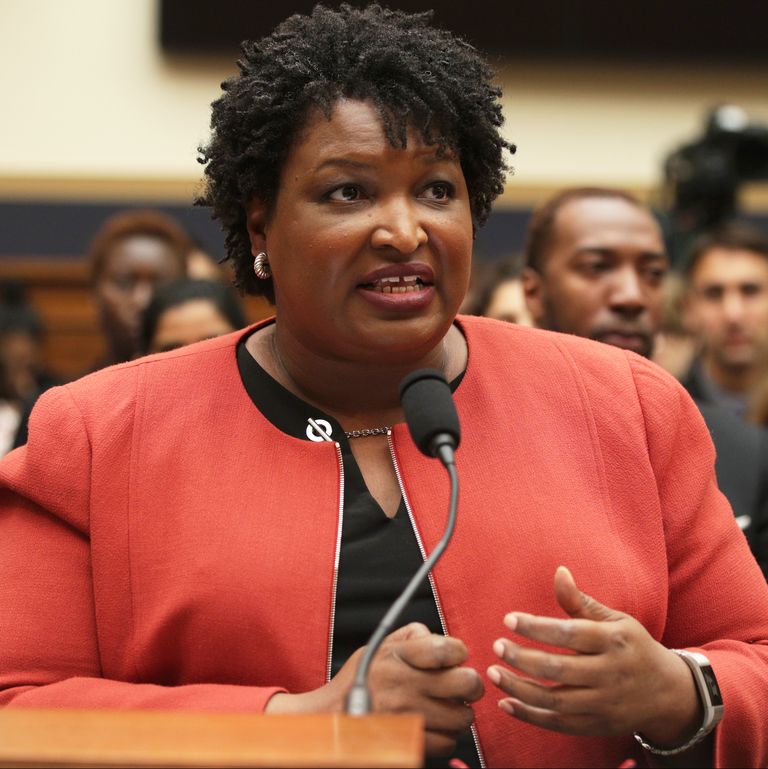
Alex Wong/Getty Images // Elle
The loss was not her end. The political star that is Stacey Abrams has continued to rise. On the heels of her defeat, she founded Fair Fight, a national organizing effort to ensure fair elections. This was followed by Fair Count, which works to achieve a fully accurate and representative census. Then, late last year, Abrams launched the Southern Economic Advancement Project to promote equitable economic and social policy for all races, classes, and genders across the region. She did all this while crisscrossing the country, giving lectures, supporting local Democratic candidates, and even becoming the first black woman to deliver the official Democratic response to President Trump’s State of the Union in 2019.
“I’ve learned that failure is not permanent,” Abrams tells me. “My responsibility is to not let failure dissuade me from my core obligations. Sometimes we pursue a challenge thinking it is about our victory, but we don’t know the true purpose until later. Not becoming governor of one state gave me the opportunity to launch a national network in 20 states [to fight for fair elections]. We are helping reform democracy in places where it was broken and battered. We are fixing access to a census that the president of the United States tried to destroy.” She continues, “I may not have won the office, but what I was able to earn for the causes I serve has been extraordinary, and beyond anything I could have imagined. Apparently, I’m a really good loser.”
For Abrams, the child of two Methodist ministers, her continued political climb is a journey that requires steadfast faith. Outside of the House of Representatives, black Southern Democrats have struggled to capture statewide office or lasting national prominence. Some of the cautionary tales are painful: After serving a decade in Congress, Tennessee’s Harold Ford Jr. was defeated in the state’s 2006 Senate race amid racist campaign propaganda. Ford served on the powerful House Budget committee and spent a decade as a media pundit but fell from grace in 2017, after being fired from Morgan Stanley for misconduct. More recently, Florida’s Andrew Gillum exited public life amid a tabloid-ready scandal of addiction. The former mayor of Tallahassee lost his gubernatorial bid in Florida the same night Abrams was defeated in Georgia. For years, Abrams and Gillum were linked as the pair most able to build a viable Democratic presence below the Mason-Dixon Line. Abrams is kind and empathetic toward her colleague, saying, “Andrew and his family deserve the privacy to address the challenges they face.”
She is unbothered by these tortured trajectories, and feels a true calling to work in the service of others no matter what may unfold. “For me, the ambition is to serve as many people as I can, to the greatest extent I can, in the best way possible,” she says. “I cannot know every challenge I will meet. My job is to nurture the intellectual curiosity and the stamina necessary to respond to the unknown.”
Backing Biden
Stamina undoubtedly will be necessary for Abrams if she is tapped to serve as Biden’s running mate. She describes Biden as having a “truly sincere sense of humor” and marvels at his heartfelt enjoyment of interacting with the American people. “When you’re in politics, you learn the difference between those who simply tolerate others and those who genuinely love people,” she says. “As an introvert, I find it fascinating. His charming gregariousness isn’t just an affect.”
Introversion may be her most comfortable default, but the public-facing Abrams exudes striking eloquence, sincere warmth, and uncompromising rootedness in identity politics—a contrast to Biden’s verbal stumbles and misconduct allegations. Although she has been called a pragmatic progressive, it is her courage and straight-no-chaser public discourse that has earned Abrams the respect of voters, organizers, and elected officials alike. The vice presidency seems an odd fit for a politician who proudly writes of her own leadership, “I refused to play my scripted part.”
But Abrams insists she understands the role. “The VP’s job is to be chief lieutenant and partner by taking on the roles and responsibilities assigned to you by the president,” she says. “I am very self-aware, and I know that my résumé...is usually reduced to ‘She didn’t become the governor of Georgia.’ But it is important to understand all the things I did to prepare for that contest. That campaign was not a whim. It was the outcome of decades of deliberate work building my capacity to serve as many people as I could, in the most effective way possible. My responsibility is to be ready to do the job—to have the core capacities that are embedded in the role. I am able to stand effectively as a partner, to execute a vision, and to serve the vision of the president.”
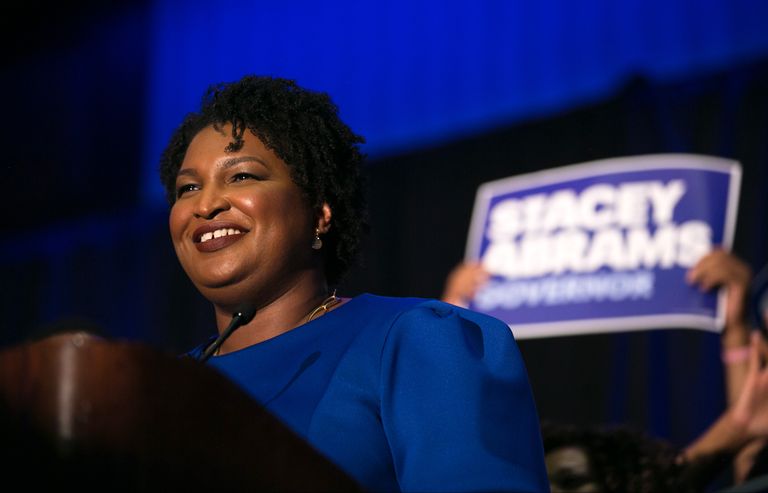
Jessica McGowan/Getty Images // Elle
I am dubious about Abrams’s willingness to recede into the supportive shadow of the vice presidency. Her genuine and strategic empathy are too highly attuned for her to stay silent in the face of perceived injustice, so I ask her to grade the national Democratic Party. “The Democratic Party has shown its strength and its cohesion during the coronavirus pandemic,” she says. “Governors are standing up and saying we will lead when those who should do not. Mayors and members of city councils are showing the best of who we can be. They are bolstered by the national apparatus amplifying their message.” Then she lightens the mood with a slight laugh, adding, “This moment is a perfect reminder that there is no national coven, no cabal declaring, ‘Democrats, here’s what we’re going to do on Thursday.’ The quality of the party is us. We are Democrats. We set the tone. We set the agenda. Those we elect to every level of government are part of it. Let’s tell our story from the bottom up, not just the top down.”
Poverty, Pandemic, and The Polls
The bottom, not the top, is where Abrams has focused her work. She and I had planned to talk in Atlanta, sitting together, sharing a meal, and discussing her vision for the country. Instead we strain to hear each other over a spotty phone line, hunkered down in our homes, doing our part to flatten the curve. It is a striking contrast to the last time we saw each other. We unexpectedly shared an elevator in a New Orleans hotel a few months after her gubernatorial loss. Abrams was accompanied by her parents, her siblings, and their families. Being Southerners, we all embraced—chatting, laughing, sharing a bit of pleasant apolitical intimacy. Now we are living in a world where a global pandemic is stealing lives, smashing dreams, crushing economies, and eliminating those little rituals of shared humanity. I want to know how Abrams is coping personally.
“We are well,” she begins. “My parents and my niece recently moved to Georgia from Mississippi. They now live quite close to both my youngest sister and me. We are all observing social distancing, but my dad is a bit surprised: ‘You’re not gonna give me a hug?’ he said. And I said, ‘Of course not. We’re gonna operate from six feet away.’ I opened the door with the Clorox Disinfecting Wipes I have with me at all times. And I didn’t hang out. I left. Because my parents are older, and my dad is in remission from prostate cancer. We remind him that despite the instinct to help, and to hug his children, the best thing he can do is stay away from us until this has passed. And my niece is 13, so social isolation for a teenager is a very different thing. It’s almost traumatic.”
Abrams is balancing the intergenerational concerns of youth and her elders while trying to be a responsible citizen of a nation gripped by infectious disease. In this way, she is like millions of ordinary Americans. But what sets her apart from many decision-makers is her insistence that our problem solving must always begin at the bottom. “Many Americans are now experiencing what poor communities live with daily. We have communities perennially facing lower wages, higher poverty, lack of access to health care, and lack of access to child care. Shift workers, low-wage workers, agrarian workers, and service workers are now being pushed over the edge,” she says. “We must be intentional about identifying these challenges and concrete about naming and pursuing the solutions. These issues aren’t ancillary. They are central to who we are. The poor deserve expanded and deepened support. The poorest among us are often the people working the hardest. And they deserve to be protected. It is not socialism to have a social safety net.”
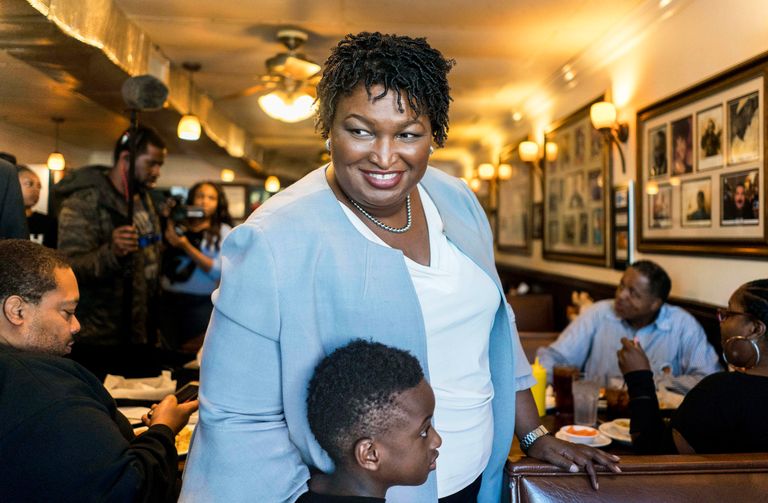
The Washington Post/Getty Images // Elle
While amplifying the concerns of the most vulnerable, Abrams remains focused on the 2020 election, even as it recedes from the national headlines to make way for coronavirus coverage. Determined to ensure that the virus does not pose a mortal threat to American democracy, Abrams rings the alarm about voting. “The November elections are not as far away as they seem,” she warns. “In the United States, 3,100 different administrative units manage elections. This public health crisis means we need funding to address the mechanics of elections now. And we need a sustained public education campaign. If we shift to vote by mail and you are Native American and living on a reservation in South Dakota or Montana, then your mail schedule is different from the average voter’s. If you’re African American or Latino, you don’t necessarily trust a voting process you can’t see and touch. These communities have shared memory and lived experience of being denied access to the vote. Vote-by-mail rules have to be clear and known and fair. We must be adaptable to the moment we’re in.”
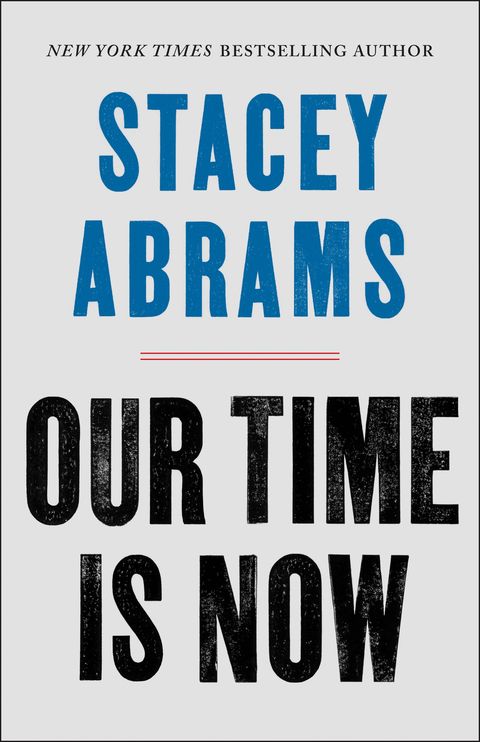
$14.99
SHOP NOW
Even from quarantine, Abrams is leading Fair Fight to help ensure the congressional stimulus package includes hundreds of millions of dollars to support vote-by-mail systems for the 2020 election. And she isn’t stopping with the most immediate election cycle. Abrams takes the long view, explaining the critical significance of this year’s census: “The Constitution does not permit the census to be postponed until 2021. Even as we shelter in place, we have an obligation to ensure a full, fair, and complete census. Our democracy works based on an allocation of political power. That allocation happens when we draw the line that says, ‘This is where you get to pick the people who will speak for you.’ The census tells us where the lines can be drawn. And if you are invisible, they will draw those lines around your power, and they will erase you. We need an accurate census so we can be seen and we can be represented.”
Black Girl Magic
As I listen to Abrams eloquently chart a path for fairness, equity, and democracy, even in the shadow of a terrifying and unprecedented public health crisis, it is easy to see her as invincible—superhuman, even. We are used to seeing black women this way—trained to rely on their seemingly unlimited reservoirs of strength and believing them magically invulnerable to hurt or harm. Abrams performs the strong black woman archetype elegantly. With palpable love and genuine humility, she explains how her parents shaped her. “My parents showed me where they came from. They taught me who they were, and they taught me what I could be. They imbued me with a sense of capacity that I don’t know I would have if I had not been their progeny,” she says. “And so my obligation is to replicate that. My power is amplified when I share it with others who do not recognize it as their own.”
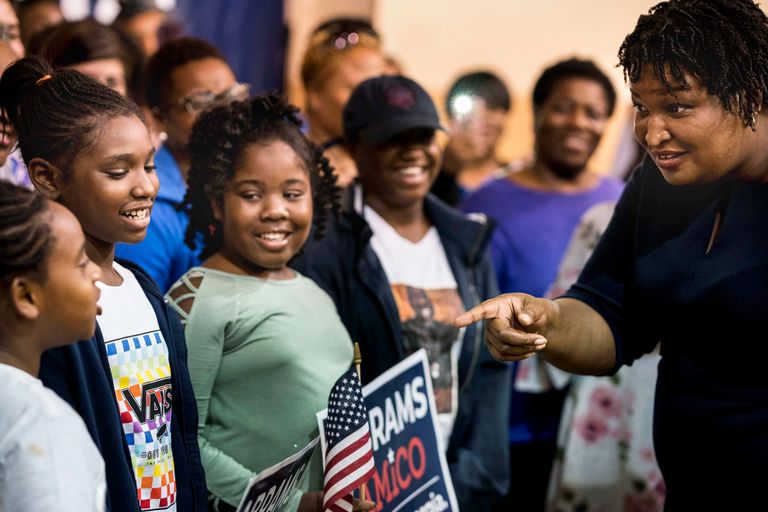
The Washington Post/Getty Images // Elle
Of course this is true. It's true for Stacey Abrams. It's true for Anita Hill. It's true for Rep. Ayanna Pressley (D-Mass.). Many smart, capable black girls are raised to become smart, capable black women who sacrifice personal comfort for collective uplift, carrying the legacy of unyielding strength and uncompromised service. Still, Abrams is human, not just an armored warrior.
I ask a simple question: "When do you feel beautiful?" For the first time, she hesitates. Stacey Yvonne Abrams, child of Gulfport, Mississippi, who dared pursue a gubernatorial seat, who confidently asserts her readiness for the vice presidency, pauses and searches for an answer. "Actually.that's not.I don't think about beauty a lot," she says. "I was often told I wasn't beautiful. Not directly. It was more like, `This person is beautiful. You're really smart.' I'm a sturdy black woman with natural hair. It took me a while to recognize that I am an attractive woman. I don't look like everyone else. But I do me really well."
"I don't look like everyone else. But I do me really well."
Abrams hits her stride. "I feel beautiful when young black girls come up to me. They are not just excited to see me, but to see themselves in me. When little girls point to the gaps between their teeth because they haven't had braces. They may come from families that will never be able to afford them, like mine couldn't. I keep my gap. I could do Invisalign, but my gap is my mother's gap. It's my grandmother's gap. This doesn't make me less, because my parents didn't have the money to have my teeth fixed with braces. And it doesn't make me less when I stand before a nation and deliver the State of the Union response."
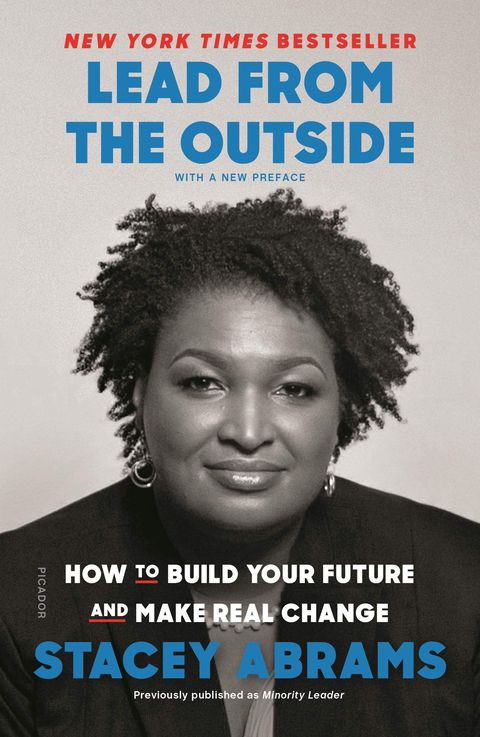
$17.00 $7.99 (53% off)
SHOP NOW
Abrams has a Sankofa sensibility. Sankofa is a West African assertion that our collective future must be rooted in a critical examination of our past. Abrams’s impulse to reach for the lessons of history while staying fixed on the necessity of service to the future suggests she may be the singularly remarkable leader America needs in this time of unprecedented economic and social change. In a world of social distancing, Abrams is a woman worth watching closely.
This article originally appeared in the Summer 2020 issue of ELLE.
[As editor-at-large, Melissa Harris-Perry acts as a guide to the stories, experiences, challenges, policies, and defining pop culture moments of women and girls of color.]
